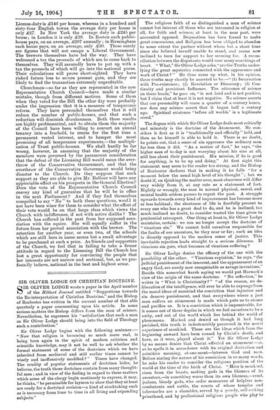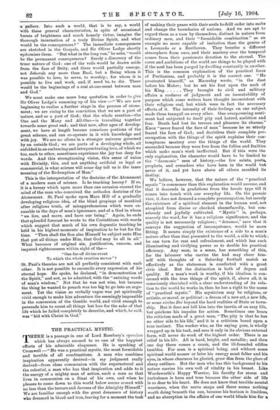S IR OLIVER LODGE wrote a paper in the April number
of the Hibbert Journal entitled "Suggestions towards the Re-interpretation of Christian Doctrine," and the Bishop of Rochester has written in the current number of that able quarterly a paper commenting upon his article. In some serious matters the Bishop differs from the man of science. Nevertheless, he expresses his "satisfaction that such a man as Sir Oliver- Lodge should bring into the field of Theology such a contribution."
Sir Oliver Lodge begins with the following sentence :— " Now that religion is becoming so much more real, is being born again in the spirit of modern criticism and scientific knowledge, may it not be well to ask whether the formal statement of some of the doctrines which we have inherited from medimval and still earlier times cannot be wisely and inoffensively modified?" Times have changed. The crudity of popular statements of doctrines hides, he believes, the truth those doctrines contain from many thought- ful men ; and in view of the feeling in regard to these matters which some of the clergy begin cautiously to express, it may, he thinks," be permissible for laymen to show that they at least are ready for a doctrinal revision—a kind of stocktaking such as is necessary from time to time in all living and expanding subjects."
The religious faith of so distinguished a man of science cannot but interest all those who are interested in religion at all, for faith and science, at least in the near past, were accounted opposed. Dogmatism has been forced to make great concessions, and Religion has been obliged to abandon to some extent the partner without whom but a short time since she believed herself unable to stand, and seems now inclined to turn for support to her seeming foe. A recon- ciliation between the disputants would ease many searchings of heart. "What," Sir Oliver Lodge asks, "are the Truths under- lying the great mysteries connected with the appearance and work of Christ ? " He thus sums up what, in his opinion, these truths may shortly be asserted to be:—" (1) Incarnation with Pre-existence ; (2) Revelation or Discovery ; (3) Con- tinuity and persistent Influence. The utterance of science on these heads," he goes on, "is not loud and is not positive, but I claim that at least it is not negative. No science asserts that our personality will cease a quarter of a century hence, nor does any science assert that it began half a century ago. Spiritual existence 'before all worlds' is a legitimate creed."
The dogma with which Sir Oliver Lodge deals most critically and minutely is the doctrine of the Atonement. He con- siders it first as it is "traditionally and officially" held, and then as he himself is able to hold it. There is no doubt, he points out, that a sense of sin oppresses the ordinary man far less than it did. "AB a matter of fact," he says, "the higher man of to-day is not worrying about his sins at all, still less about their punishment. His mission, if be is good for anything, is to be up and doing." At first sight this statement may seem to the reader too strong, and the Bishop of Rochester declares that in making it he falls "for a moment below the usual high level of his thought " ; but we doubt if, on thinking the matter over, most observers will differ very widely from it, at any rate as a statement of fact. Rightly or wrongly, the man in normal physical, moral, and mental health seldom pauses to regret the past. A struggle upwards towards every kind of improvement has become more or less habitual; the shortness of life is fearfully present to every one who has a great deal to do, and he is inclined, too much inclined no doubt, to consider wasted the time given to penitential retrospect. One thing at least is, Sir Oliver Lodge maintains, certain : we can no longer accept the doctrine of "vicarious sin." We cannot hold ourselves responsible for the faults of our ancestors, be they near or far; such an idea is directly opposed to the modern sense of justice. This inevitable rejection leads straight to a serious dilemma. If vicar ions sin goes, what becomes of vicarious suffering ?
Sir Oliver Lodge denies the efficacy of the one with the possibility of the other. "Vicarious expiation," he says, "the judicial punishment of the innocent, and the appeasement of an angry God, are surely now recognisable as savage inventions." Beside this somewhat harsh saying we would put Harnack's view of the origin of the same doctrine. "No reflection," he writes in "What is Christianity ? " "of the reason, no de- liberation of the intelligence, will ever be able to expunge from the moral ideas of mankind the conviction that injustice and sin deserve punishment, and that everywhere where a just man suffers an atonement is made which puts us to shame and purifies us. It is a conviction which is impenetrable, for it comes out of those depths in which we feel ourselves to be a unity, and out of the world which lies behind the world of phenomena. Mocked and denied as though it had long perished, this truth is indestructibly preserved in the moral experience of mankind. These are the ideas which from the beginning onward have been roused by Christ's death, and have, as it were, played about it." Yet Sir Oliver Lodge by no means denies that Christ effected an atonement-31', as he spells it in accordance with its original derivation and primitive meaning, at-one-meat—between God and man. Before stating the nature of his conviction in so many words, he asks his reader to consider the religious position of the world at the time of the birth of Christ. g: Here is mankind, risen from the beasts, making gods in the likeness of its ancestors,—in something worse than its own likeness,—cruel, jealous, bloody gods, who order massacres of helpless non- combatants and cattle, the courts of whose temples and tabernacles are a shambles, served by a greedy, self-seeking priesthood, and by professional religious people who play to a gallery. Into such a world, that is to say, a world with these general characteristics, in spite of occasional bursts of brightness and much homely virtue, imagine the thorough incarnation of a truly Divine Spirit, and what would be the consequences ? " The immediate consequences are sketched in the Gospels, and Sir Oliver Lodge shortly 'epitomises them. "But what in the long run," he asks, "would be the permanent consequences ? Surely a discovery of the truer nature of God : one of the veils would be drawn aside from the face of Deity, and there would partially emerge, not Jehovah any more than Baal, but a Being whom it was possible to love, to serve, to worship ; for whom it is possible to live and work, and, if need be, to die. There -would be the beginnings of a real at-one-ment between man and God."
• We must make one more long quotation in order to give Sir Oliver Lodge's summing up of his view :—" We are now beginning to realise a further stage in the process of atone- ment; we are rising to the conviction that we are a part of nature, and so a part of God ; that the whole creation—the One and the Many and All-One—is travailing together towards some great end; and that now, after ages of develop- ment, we have at length become conscious portions of the great scheme, and can co-operate in it with knowledge and with joy. We are no aliens in a stranger universe governed by an outside God ; we are parts of a developing whole, all enfolded in an embracing and interpenetrating love, of which we too, each to other, sometimes experience the joy too deep for • words. And this strengthening vision, this sense of union with Divinity, this, and not anything artificial or legal or commercial is what science will some day tell us is the inner meaning of the Redemption of Man."
This is the interpretation of the doctrine of the Atonement of a modern man of science. Is he teaching heresy? If so, it is a heresy which upon more than one occasion crossed the mind of the man who conceived the orthodox doctrine of the Atonement. St. Paul spoke upon Mars Iill of a gradually developing religious idea, of the blind gropings of mankind 'after religions truth, of misapprehensions which were ex- cusable in the days of man's ignorance, and of a God in whom "we live, and move, and have our being." Again, he ends that splendid forecast he wrote to the Corinthians with words which suggest that much of his own dogmatic teaching he held in his highest moments of inspiration to be but for the time. "Then shall the Son also Himself be subject unto Him
• that put all things tinder Him, that God may be all in alL" What becomes of original sin, justification, ransom, and imputed righteousness within sight of the—
"One far-off divine event To which the whole creation moves"?
• St. Paul's theories are not all perfectly consistent with each other. It is not possible to reconcile every expression of his eternal hope. He spoke, he declared, "in demonstration of • the Spirit," and not, as he admitted, with the "enticing words of man's wisdom," Not that he was not wise, but because the thing he wanted to preach was too big to go into an argu- ment. Yet the vision so verbally vague was yet spiritually vivid enough to make him adventure the seemingly impossible in the conversion of the Gentile world, and vivid. enough to persuade him to count all things but loss for the sake of that life which he failed completely to describe, and which, he said, was "hid with Christ in God."



































 Previous page
Previous page